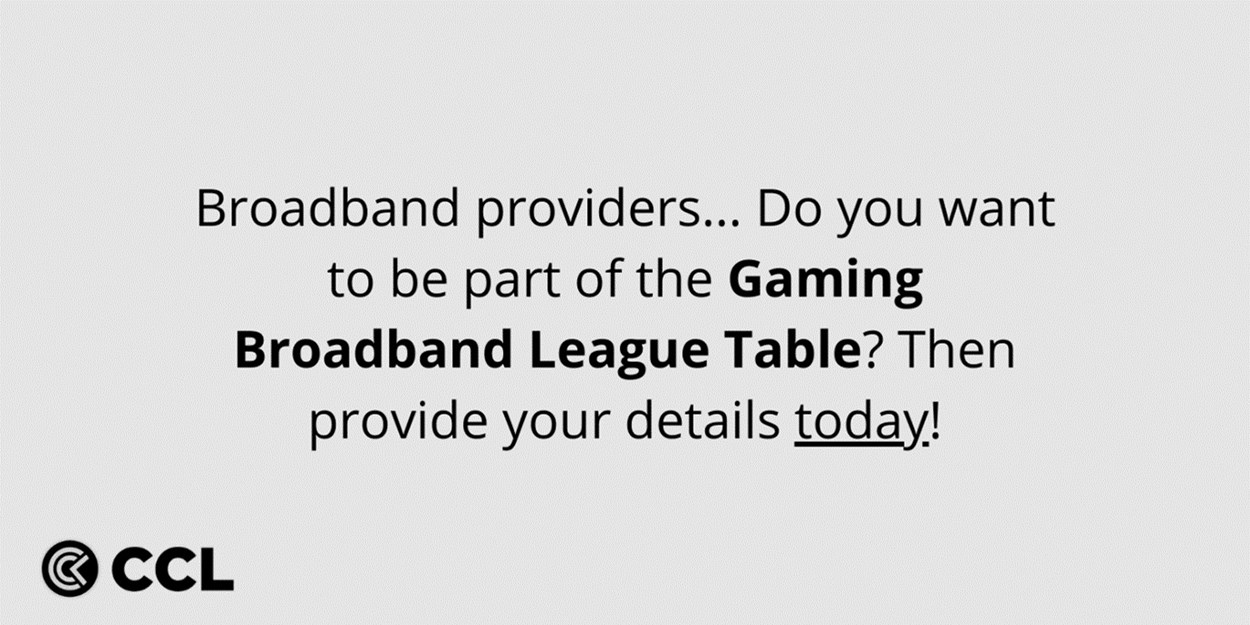Latency, which measures the time delay between a mouse click or keyboard press and what happens in a game, is not publicly displayed by the majority of the UK’s broadband providers.
As a result, gamers are not given the full picture of a broadband package’s performance - despite many broadband packages being advertised as ‘ideal for gaming’.
In response, and to help gamers choose a broadband package that’ll deliver a great online gaming experience, we’ve created the Gaming Broadband League Table, including latency where we’ve been able to find it (if you’re a broadband provider and you want to provide this info, let us know!):
How we calculated the positions in our league table
In order to calculate which broadband providers are in with a chance of winning the league, and which should be fighting relegation, we looked at six key sources of information:
- Latency.
- Type of fibre broadband connection.
- Download speed.
- Upload speed.
- Cost.
- Popularity.
Latency
For gamers, latency is a killer (literally, if you’re playing a first person shooter).
In technical terms, latency (also called ‘ping’) refers to the amount of time it takes for a data packet to go from one place to another.
In gaming terms, this translates to the time between a button push and the reaction you see on screen. As you can imagine, if this reaction time is too high, then gaming online can become difficult, even impossible. It can certainly make the difference between winning and losing.
So, what latency should you be looking for with your broadband connection?
- 20ms or less - this is the ideal. The closer you can get latency to zero, the better your gaming experience will be.
- 20ms to 100ms. This is fairly acceptable, but in hyper-competitive gaming environments, probably won’t cut the mustard.
As latency is so important for competitive gaming, we’ve made this a primary ranking factor alongside the type of fibre connection.
The latency information problem
If you want the best broadband connection for gaming, then you want to find a super fast connection with low latency.
Great! But, there’s a problem…
It’s nigh on impossible to find the average latency of most broadband connections on the market.
Whilst we understand that latency will be affected very much by individual circumstances (e.g. where you live, the type of connection you have), is it too much to ask for broadband providers to advertise the average latency of their fibre broadband connections?
In researching this article, we did reach out to a number of the biggest fibre broadband providers, but didn’t hear back from their press offices…
So, we’d like to issue this challenge to broadband providers. If you’re serious about catering to gamers, give us the information we need to make informed choices!
Where we’ve been able to find some information about latency, we have used this as a primary ranking factor, but where we haven’t been able to find this information, we’ve worked on the following assumption: a broadband package with fast download and upload speeds is likely to have low latency too.

Full fibre or not? Not all broadband connections are created equal
One of the most important ranking factors that we used to create our league table was the type of fibre broadband connection.
Sure, the marketing spiel makes the claim that fibre broadband is ultra-fast, and that’s true.
But, it’s important to know exactly what type of fibre broadband connection a provider offers - because it can make a difference in terms of performance.
There are two main types of fibre broadband:
- Fibre-to-the-cabinet (FTTC).
- Fibre-to-the-premises (FTTP). This type of broadband connection is usually called ‘full fibre’.
So, what’s the difference between them?
Fibre-to-the-cabinet (FTTC)
With a fibre-to-the-cabinet broadband connection, fibre optic cables will run from the telephone exchange to a metal cabinet located in a street near your home.
The connection will then run from the metal cabinet to your home via standard copper telephone wires.
Fibre-to-the-cabinet connections are currently the most common type of fibre broadband connections found across the UK.
Broadband packages using a fibre-to-the-cabinet connection will typically advertise speeds of up to 76Mb.
Fibre-to-the-premises (FTTP/Full Fibre)
Fibre-to-the-premises broadband connections use fibre optic cables throughout the journey from the telephone exchange to your home. This type of connection will bypass the metal cabinet and simply connect directly to your home.
As you can imagine, fibre-to-the-premises is far quicker than fibre-to-the-cabinet connections as there are no old-fashioned copper telephone wires slowing things down.
Broadband packages using a ‘full fibre’ connection are typically advertised with speeds of up to 1GB (1,000Mb).
Currently, only a minority of UK households are able to have a full-fibre broadband connection. You can find out if full-fibre broadband is available in your area here.
Note - it doesn’t matter what type of broadband connection you have, if you’re using WiFi rather than an Ethernet connection, you won’t be getting the best speeds for gaming.
The need for speed
Aside from the connection type and latency, one of the other factors that we’ve used in determining our Gaming Broadband League Table is the speed of the connections that broadband providers are offering.
More specifically, we’ve looked at download speeds.
This is because games increasingly require chunky updates and downloads on a regular basis. 50Gb one day patches are not uncommon these days…
Streaming much?!
We’ve also taken into account upload speeds.
Why?
Because of the rise of the streamers. From Twitch to YouTube, more and more gamers are hosting their own ‘Let’s Play’ channels where viewers can watch them play in realtime.
But for an optimal streaming experience, you’re going to need a broadband connection with fast upload speeds.
Cost
If gaming is your hobby, then it’s likely you sink plenty of your spare cash into it.
So, whilst we’ve taken the price of these broadband connections into consideration, we haven’t made it the main ranking factor in our league table.
Sure, if a package is exorbitantly expensive, or ridiculously cheap, we haven’t ignored this. But, we recognise that the most serious gamers don’t see cost as the main motivating factor when it comes to choosing a broadband connection.
Popularity
Whilst we did take a look at the fine details of each broadband provider's package, we also wanted to see how they performed from a consumer awareness perspective.
We took a look at Google search data to see which broadband providers were receiving the most searches per month regarding gaming broadband:
- BT gaming broadband.
- Sky gaming broadband.
- Virgin gaming broadband.
- Vodafone gaming broadband.
- EE gaming broadband.
As you can see, the popularity of these searches corresponds fairly closely to each broadband provider’s league table position.
Get a gaming PC that does your broadband connection justice
We hope you’ve found our Gaming Broadband League Table helpful!
We’ll be keeping this updated, particularly if we discover more information around latency as this is a key metric that gamers need to know when selecting broadband.
If you do discover some information that would help gamers select the best broadband, and which would make our league table even better, let us know!
And whilst you’re here, check out our range of Horizon and Nazare gaming PCs. After all, if you’re going to be signing up to a high-performance broadband package, you’re going to want a gaming PC to match.







